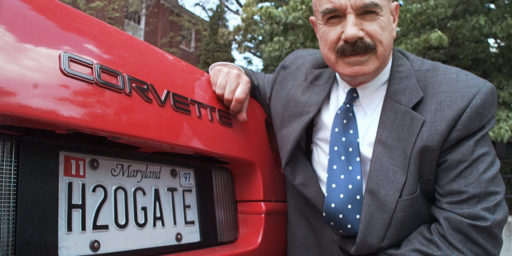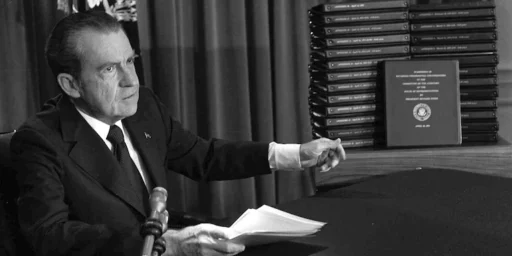Deep Throat Didn’t Say “Follow the Money”
Frank Rich begins an otherwise annoying column with an interesting tidbit:
The morning the Deep Throat story broke, the voice on my answering machine was as raspy as Hal Holbrook’s. “I just want you to remember that I wrote ‘Follow the money,’ ” said my caller. “I want to know if anybody will give me credit. Watch for the accuracy of the media!”
The voice belonged to my friend William Goldman, who wrote the movie “All the President’s Men.” His words proved more than a little prescient. As if on cue, journalists everywhere – from The New York Times to The Economist to The Washington Post itself – would soon start attributing this classic line of dialogue to the newly unmasked Deep Throat, W. Mark Felt. But the line was not in Woodward and Bernstein’s book or in The Post’s Watergate reportage or in Bob Woodward’s contemporaneous notes. It was the invention of the author of “Butch Cassidy and the Sundance Kid,” “Marathon Man” and “The Princess Bride.”
Although I’ve read the book at least twice–although not since the late 1980s–without ever having seen the movie, I didn’t realize that.
The remainder of the column is rather bizarre, however, contending that the “lapdog media” covered the Felt revelation as if Watergate were somehow not a bad thing.
. . . Nixon’s special counsel, Charles W. Colson, embarked on a ruthless program of intimidation that included threatening antitrust action against the networks if they didn’t run pro-Nixon stories. Watergate tapes and memos make Mr. Colson, who boasted of “destroying the old establishment,” sound like the founding father of today’s blogging lynch mobs. He exulted in bullying CBS to cut back its Watergate reports before the ’72 election. He enlisted NBC in pro-administration propaganda by browbeating it to repackage 10-day-old coverage of Tricia Nixon’s wedding as a prime-time special. It was the Colson office as well that compiled a White House enemies list that included journalists who had the audacity to question administration policies.
Such is the equivalently supine state of much of the news media today that Mr. Colson was repeatedly trotted out, without irony, to pass moral judgment on Mr. Felt – and not just on Fox News, the cable channel that is actually run by the former Nixon media maven, Roger Ailes. “I want kids to look up to heroes,” Mr. Colson said, oh so sorrowfully, on NBC’s “Today” show, condemning Mr. Felt for dishonoring “the confidence of the president of the United States.” Never mind that Mr. Colson dishonored the law, proposed bombing the Brookings Institution and went to prison for his role in the break-in to steal the psychiatric records of The Times’s Deep Throat on Vietnam, Daniel Ellsberg. The “Today” host, Matt Lauer, didn’t mention any of this – or even that his guest had done jail time. None of the other TV anchors who interviewed Mr. Colson – and he was ubiquitous – ever specified his criminal actions in the Nixon years. Some identified him onscreen only as a “former White House counsel.”
Had anyone been so rude (or professional) as to recount Mr. Colson’s sordid past, or to raise the question of whether he was a hero or a traitor, the genealogical line between his Watergate-era machinations and those of his present-day successors would have been all too painfully clear. The main difference is that in the Nixon White House, the president’s men plotted behind closed doors. The current administration is now so brazen it does its dirty work in plain sight.
Leaving aside the absurdity of lumping the current administration in with Nixon’s, what coverage was Rich watching? Granted, I did not watch a lot of it on television, as I find reading more efficient. Still, there was not a single televised appearance or written quotation from Colson or G. Gordon Liddy or their Watergate cohorts that I saw that didn’t ask those questions. Further, while Liddy remains defiantly unapologetic for his crimes, for which he served more jail time by far than anyone else involved in the scandal, Colson is demonstrably rehabilitated. He has devoted the last decades of his life to helping others, notably with his prison ministry. Surely, there is a point at which one regains standing to have a moral conscience?
Of course, Rich’s argument is nothing more than thinly disguised ad hominem. Regardless of how one feels about Colson’s Watergate crimes or his current lifestyle, his arguments about Felt stand on their own merits. Either Felt had a duty to take what he knew through the proper channels–to include Congress–or he did not. Either he had a duty to his boss or he did not. Either we want kids to look up to heroes or we do not. What has Colson’s past to do with the merits of those positions?






Colson’s past has to do with some perspective of the situation on which he is opining. I haven’t seen him on the tv, but if he was just spouting platitudes about how loyalty to the president is more important to loyalty to the country then the kids may have no idea about how to evaluate what he is saying.
Rich’s pseudo-argument is from the same place that the “chickenhawk” pseudo-argument comes from — the position that ideas have no inherent value, but are no better than the men who espouse them.
It’s going about it backwards. First you determine whether the ideas have merit. Then, if they don’t, the motives of their promoters may be fair game for discussion.